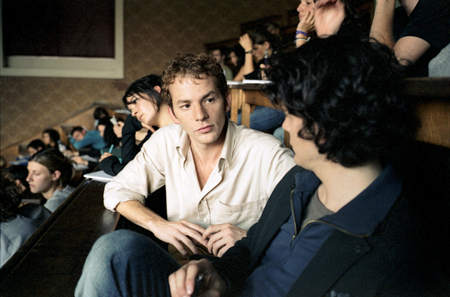|
Reviews of Recent Independent, Foreign, & Documentary Films in Theaters and DVD/Home Video
Directed by: Emmanuel Bourdieu. Produced by: Mani Martazavi, David Mathieu-Mahias & Yorick Le Saux. Written by: Bourdieu & Marcia Romano. Director of Photography: Yorick Le Saux. Edited by: Benoit Quinon. Music by: Grégoire Hetzel. Released by: Strand Releasing. Language: French with English subtitles. Country of Origin: French/Belgium. 107 min. Not Rated. With: Malik Zidi, Thibault Vinçon, Alexandre Steiger, Thomas Blanchard, Dominique Blanc, Natacha Régnier & Jacques Bonnaffé.
Presumably set in the Sorbonne, the film follows a small clique of literature grad students in their mid-20s, lorded over with ease by the judgmental André. The star of the class, André’s lucid pronouncements do have the ring of truth in them. He’s the type of person whose admonishment for silence is much louder than the offending noise. Whether or not one of his friends/followers is asking him for his opinion, André finds a way to remain the center of attention Little is left unscathed by his observations. A fellow literature student’s shoes are deemed, “vile,” a fellow student’s short story “narcissistic crap,” and in a Lady Bracknell-like declaration, that “Coffee without sugar simply isn’t coffee.” André is particularly focused on nurturing Eloi, the son of a famous novelist. But when Marguerite (Natacha Régnier), the sole female allowed into their circle, dares to keep her work away from André’s gaze, he finds a brutally underhanded way to make his judgment felt. The film won the Grand Prize at last year’s Critics’ Week at Cannes, the opinionated one-upmanship being just one appealing factor. The first half-hour begins leisurely, but soon there’s a great pay-off as the momentum builds after the establishing of the tics within this multi-faceted but co-dependent set. The camera is like an alien outsider, who can pick up on and discern the power plays within a group.
Director and cowriter Emmanuel Bourdieu was formerly a philosophy professor, but his flowing dialogue is accessible within his rarefied setting,
never succumbing to mind-numbing or exclusive philosophical exchanges (as in the fairly recent Grande École or Kings and Queen, just to
start off a list.) As André, Thibault Vinçon has a round and open face, which can be read either as guarded or enough of a poker face to keep the
audience guessing in his portrayal of the skilled manipulator, who is a prescient benefactor as well (in his own peculiar manner). In how he
skillfully and with much suspense reveals the nature of his ambitious students, Bourdieu matches André’s motivations, by not always following
the most direct or obvious route. Kent Turner
|

